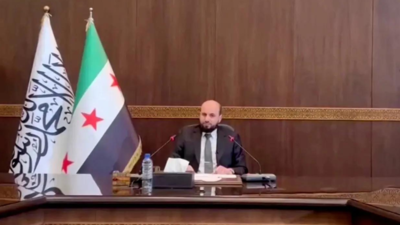
Syria’s new prime minister, Mohammad al-Bashir, has pledged to protect minority rights following the ouster of President Bashar al-Assad. He also called on Syrian refugees to return home, according to an interview published Wednesday in Italian newspaper Corriere della Sera.
Bashir, appointed Tuesday as transitional head of government until March 1, leads a country facing significant challenges after nearly 14 years of war. He told Corriere della Sera, “Precisely because we are Islamic, we will guarantee the rights of all people and all sects in Syria.”
Syria’s war has displaced half the population, with six million seeking refuge abroad. Bashir urged their return, saying, “Syria is now a free country that has earned its pride and dignity. Come back.” Damascus’s main airport is expected to reopen soon.
Bashir also expressed willingness to collaborate with anyone who doesn’t support Assad.
The new leadership also claims that they aim to reassure minorities they won’t face similar treatment while promising justice for victims of Assad’s regime. HTS leader, Abu Mohammed al-Jolani, now using his real name Ahmed al-Sharaa stated, “We will not pardon those involved in torturing detainees.” He urged countries to extradite any officials who fled Syria to face justice. In Damascus hospitals, families searched for missing loved ones, seeking closure after years of uncertainty.
The appointment marks a transition for Syria after decades under the Assad family. The Islamist-led alliance, spearheaded by Hayat Tahrir al-Sham (HTS), rapidly defeated Assad’s forces, ending five decades of family rule.
Celebrations erupted across Syria and internationally. Soon after it was revealed that Assad govenrment was overthrown, people thronged the streets to celebrate the fall of a regime that had ruled the country with an iron fist for decades. Many in Damascus and elsewhere in Syria poured onto the streets dancing and chanting slogans like “freedom”, “its over”, “Assad is gone,” and “Long live Syria and down with Bashar al-Assad”. People also gathered to celebrate in the central squares of Damascus, chanting anti-Assad slogans and honking car horns.
However, in Aleppo, residents expressed mixed feelings. While some expressed a sense of emerging safety, others voiced concerns about daily life uncertainties and rising prices.
In Assad’s ancestral village, his father’s tomb was burned. The Baath party announced a suspension of activities and the handover of assets.
The international reactions also vary. The UN urged an inclusive transition, while its Secretary-General expressed support for a smooth power transfer. Russia called for Syrian stabilization and criticized Israeli airstrikes targeting Assad’s military sites. Germany and other countries cautioned against foreign military intervention.
Qatar plans to reopen its Damascus embassy. Former US ambassador to Syria, Robert Ford, suggested testing Jolani’s promises, including international monitoring of any discovered chemical weapons.
The rebel offensive began on November 27, coinciding with a ceasefire in the Israel-Hezbollah war.






